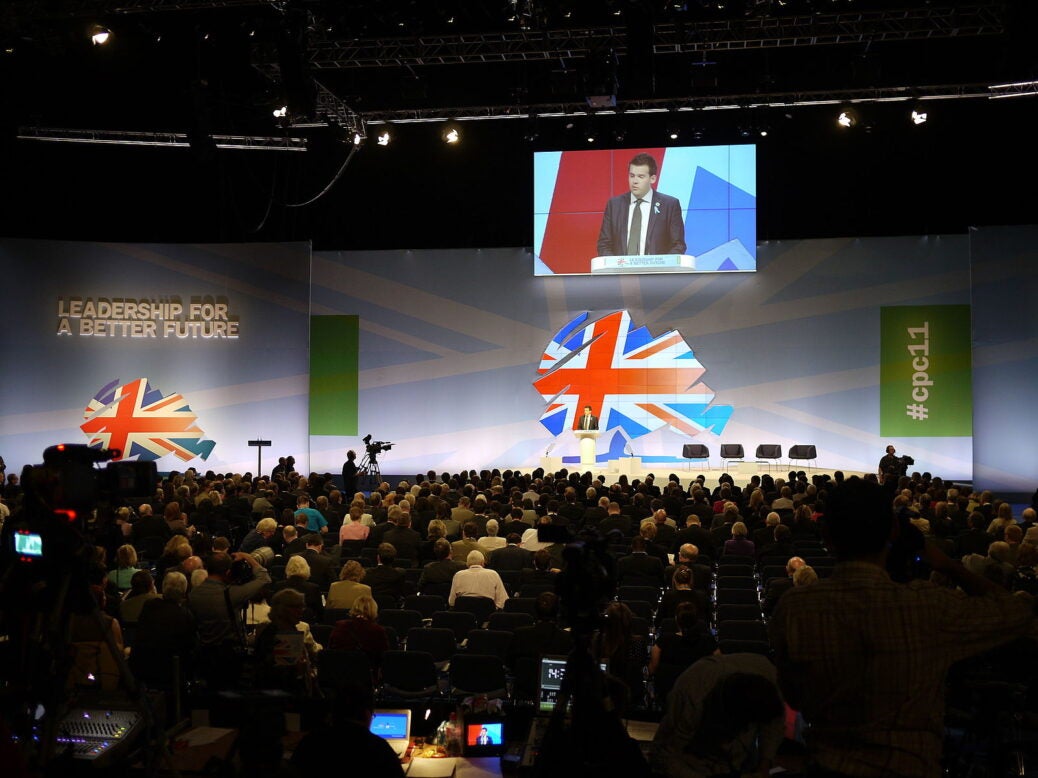
The recent Labour and Tory party conferences were full of potential for savvy businesspeople looking to climb the ‘ladder of influence’, says former House of Commons clerk Eliot Wilson
The party conference season is over, with Labour’s seaside holiday and then the Conservative jamboree in Manchester having concluded (the Liberal Democrats held a conference too but it was purely an online affair). Readers will have seen the highlights on the news, the soundbites from speeches by Boris Johnson and Keir Starmer, Rishi Sunak and Angela Rayner. But these annual events are political carnivals, attended by the devoted and the geeky, seeking to witness their heroes in the flesh. Right?
Yes and no. There is no doubt that the main stage events at party conferences are purely publicity events, designed for the leading lights to put their best selves across to their members, punctuated, in Labour’s case, by inconvenient expressions of dissent from the conference floor. All of it makes for good, or at least passable, television and fuels the copy of hundreds of journalists. I was in Manchester last week for the Conservative conference, and the party’s comms team was obviously working very hard.
But there is another conference, one to which business leaders, investors and entrepreneurs should pay attention. This is the conference away from centre stage, at the fringe events and the social engagements that range from champagne-drenched drinks parties to coffee and sandwiches with an earnest thinktank.
Any shrewd commercial brain knows that one way of seizing a business opportunity is to engage early on in the process, upstream of the final outcome. A few days wandering the conference fringe are worth the investment of time, because here ideas and policies for the future are presented, explored and expounded.
I saw a lively debate on the future of the nuclear industry in helping the UK meet its energy needs; an in-depth discussion of transport for the North and the options for infrastructure and strategic communications as part of the ‘Northern Powerhouse’; an informed and expert dissection of ‘levelling up’ and the economic levers likely to be needed to fulfil the government’s promises. Remember, these are not sanctioned by Downing Street. Rather, they are idea labs, and watching—and perhaps contributing—to these events could give you a hand in shaping policy announced on the main stage in 2022 or 2023.
Conferences are also social events. From dawn till dusk, and well beyond, the bar of the Midland Hotel in Manchester was always full to overflowing, with activists, MPs, advisers and lobbyists, cabinet ministers making the occasional pass to breathe the same air as the footsoldiers.
Formal lobbying is a strictly regulated matter, and is likely to be yet more tightly controlled following the Boardman review of David Cameron’s activities on behalf of Greensill Capital. I have argued here before that lobbying must be regulated with a degree of realism and acceptance of human nature, but we seem to be heading towards tighter regulation. In any event, the party conference is an opportunity at least to rub shoulders and perhaps share a coffee with ministers who are taking decisions both now and in the future.
We all know that to have impact, one must be memorable. And, in the words of a famous supermarket slogan, every little helps. If your name, your business or your ideas ring even faint bells in ministerial minds in the weeks and months following the party conference, you will have succeeded in climbing a rung or two of the influence ladder. Maybe it is a junior transport minister sorting through the stack of business cards he collected, or an energy minister recalling a conversation she had in the queue for coffee; it can all move the needle. It is all part of the ‘soft power’ of government relations.
Attending the governing party’s annual conference is not a secret way of getting ahead in business or enterprise. It is, though, a few days’ work – and it is work; you will be exhausted at the end, which may pay long-term dividends and will certainly put you in the centre of policy-making and execution. Find a wingman (or indeed wingwoman) who’s flown these routes before to help guide you, and get your head around the big ideas and potential solutions facing government. In the end, ministers create the environment in which you have to operate, so why not be in there from the start? Next year’s conference is in Birmingham. Just saying…
Eliot Wilson is co-founder of Pivot Point Group
Main image: NCVO London
More from Spear’s
Philanthropy: Princess Eugenie on Ascension Island’s sustainable fishing success story
The best tax lawyers for high-net-worth individuals
Spear’s Wealth Insight Forum 2021: Watch on demand now






